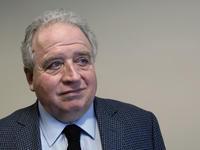Lecture 3: Knowledge and Achievement as Public Policy Goals
All are welcome to attend these free, public lectures - we hope you will be able to join us!
Book here
Venue
Lecture Theatre, H B Allen Centre, Keble College, 25 Banbury Road, Oxford OX2 6NN
https://www.google.com/maps/embed?pb=!1m18!1m12!1m3!1d2469.4631500798746!2d-1.2631079229813136!3d51.76113969213479!2m3!1f0!2f0!3f0!3m2!1i1024!2i768!4f13.1!3m3!1m2!1s0x4876c55d7d60485f%3A0xe7cd3d1c070ca7!2sThe%20H%20B%20Allen%20Centre!5e0!3m2!1sen!2suk!4v1696515499368!5m2!1sen!2suk
Registration
Booking is now open for in-person attendance - please register here https://bookwhen.com/uehiro
Please note that seats are allocated on a first-come, first-served basis. Since there is no charge for the event, not all registered participants attend. To compensate for this, we operate a policy of overbooking so please arrive early in order to guarantee your seat.
Professor Tom Hurka

Professor Thomas Hurka is currently Chancellor Henry N. R. Jackman Distinguished Professor of Philosophical Studies at the University of Toronto. He gained a B.Phil. and D.Phil. in Philosophy at University of Oxford University, after a B.A. at the University of Toronto.
Hurka has published on a number of topics, however his main area of research and teaching is moral and political philosophy, especially normative ethical theory. His writings focus on perfectionist moral theories: authored books include Perfectionism (OUP) and Virtue, Vice, and Value (OUP). He has also discussed the justification of punishment, population ethics, nationalism, friendship, and the morality of war.
In 2011, Professor Hurka published a non-academic book The Best Things in Life (OUP), about the many things – pleasure, knowledge, achievement, virtue, personal love – that can make life desirable. Later, in 2014, he published British Ethical Theorists From Sidgwick to Ewing (OUP), the first full historical study of an important strand in the development of modern moral philosophy. The book follows a series of British ethical theorists from the late nineteenth century to the mid-twentieth century, who shared key assumptions that made them a unified and distinctive school.
All Dates
Monday 4 March 2024, 16:30 - 18:15 (followed by drinks reception)
Wednesday 6 March 2024, 16:30 - 18:15
Friday 8 March 2024, 16:30 - 18:15